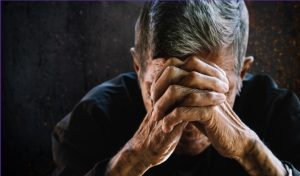ELDER ABUSE PREVENTION

Elder abuse is an uncomfortable topic to discuss, but it is very important to understand the impact of elder abuse. Each year, approximately 10% of Canadian seniors are victims of crime with the vast majority of them being property crimes. Up to 1% of Canadian seniors experience violent crimes or physical abuse and about 45 percent of seniors abused report experiencing some form of abuse from the age of 65 on. A study conducted by the Canadian Department of Justice found that the three principal areas of concern for seniors are:
- Financial crimes committed by strangers
- Crime and abuse by relatives and caregivers, and
- Crime and abuse in institutional settings.
Recognizing the signs of elder abuse
There are five forms of elder abuse, and the signs may vary depending on the form of abuse. The five forms of abuse are physical, sexual, psychological/emotional, neglect/abandonment, and financial. Signs of elder abuse include but are not limited to:
- Unexplained bruises, marks, broken bones, or abrasions that could be indicative of physical abuse or any bruises or injuries to the breasts or genitalia.
- Withdrawal from previously enjoyed activities, sudden change in alertness or unusual depression.
- Sudden change in financial situation.
- Poor hygiene, bedsores, unusual weight loss or unattended medical needs.
- Belittling, threats, or frequent arguments between patient and caregiver, and more
Signs of elder abuse are going to vary from person to person and case to case, but it is crucial to note any unexplained changes in behaviour of your loved one as it may be indicative of elder abuse. For a full list of warning signs, visit:
https://www.domesticshelters.org/articles/lists/signs-of-elder-abuse
Empowering seniors to protecting themselves
Encourage elders to retain as much control over their own lives as possible.
Knowledge is empowering, so it is important that older persons know their rights. Ensuring the elderly have the power to make everyday life choices may reduce the prevalence of abuse. Losing one’s autonomy is certainly difficult ad it is suggested that you encourage your loved one to maintain their autonomy as much as possible. Seniors that understand their rights are best equipped to advocate for themselves when it comes to their finances, personal care, quality of healthcare, and other aspects of daily life.
Educate your elderly loved ones on financial scams and what to look for.
Phone and email scams are very common and something that persons of all ages are subject to, but seniors are primarily victimized by these types of scams. Scammers will often come up with clever ways to rush their victims into quick decisions. Please keep in mind that no bank or company that does business with you will ever ask for your SIN. Scammers may also pretend to be revenue Canada or another branch of the government demanding money. If this happens to you, hang up right away and login to your my CRA account to check your mail items. Your inbox from the CRA is secure and only persons logged into your account can view the contents. Another way scammers attempt to get money or personal information is to pretend to be family members in trouble. A scam that has been occurring recently has been scammers calling seniors or older adults pretending to be their grandkids or kids in jail needing bailout money. It is important that you do not offer much information over the phone as they may try to lead you to saying a family members name so they can make the lie more believable. For instance, they may say “come on grandma/grandpa, it’s me, your grandson/granddaughter, you don’t recognize my voice.” If you do not recognize the person speaking, hanging up immediately.
In addition to these examples, it is important to do further reading about how to identify potential scams. Being on the internet can make anyone vulnerable to potential scams, so it is important that you invest in quality internet security such as Norton and do not visit any websites that seem suspicious. There are settings on your browser that provide additional security and they can be found under settings -> privacy and security and it is recommended that you turn on all of the advanced security settings in addition to getting security software that can further protect you while you browse.
Encourage your loved one to stay engaged in physical activity and community engagement
There is no clear-cut way to protect yourself from physical abuse, however you can reduce your risk by remaining physically active and engaged in the community. Engaging in regular physical activity not only provides physical and mental strength and wellbeing, but it also leads to prolonged autonomy. Engaging in a physical activity such as walking 3-4 times a week can improve your overall health and reduce your risk of experiencing elder abuse.
Being involved in the community is another way to help lower your risk. Participating in in-person and online activities will help reduce the risk of social isolation. Social isolation can lead to other health problems and can make you more vulnerable to persons who may take advantage of your vulnerable mental and physical state.
Educating caregivers and family members
Unfortunately, abuse of all kinds is typically inflicted on victims by their own family or caregivers. In 32% of reported elder abuse cases, the offender is family member (e.g., adult child, current or former spouse). The primary reason this occurs is because of the burden of responsibility on caregivers that grows more complex the longer they have to care for someone. This is especially true when caregivers have to provide physical needs such as bathing, feeding, and toileting.
With this in mind, it is important for caregivers to take advantage of respite programs and services. Many retirement facilities and home care companies provide respite care options such as trial stays at retirement homes and respite care for seniors from home care companies. There are also day programs for seniors that provide respite for caregivers. These programs are offered at seniors’ centers or community centers, and they can be for the general public, or they can be ailment specific such as dementia day programs, Parkinson’s, stroke survivors etc. Caregivers need to take time for themselves as often times it is not only their loved one they are looking after. Many of them have families and jobs and other stressors in their lives that can lead to burnout and perhaps some form of abuse towards their loved one or the person they are caring for.
Raising awareness and advocacy
Why does this happen? Elder abuse can be caused by a number of different reasons, none of which justify the behaviour, but can be a reminder for caregiver self care and for seniors to understand the warning signs of abuse triggers. Some primary reasons caregivers and family members abuse their loved ones are because of economic problems such as high unemployment, cultural changes and decreased respect for the elderly, personal problems such as substance abuse, personal trouble in the caregivers life, mental or emotional impairments, or a tolerance of violence towards family members as a method of dealing with stress within the family.
In institutional settings, it is more common for an overworked, underpaid, or unqualified caregiver in the presence of potentially powerless and vulnerable persons creating an environment that can contribute to elder abuse.
It is important to understand the factors that may lead a person to become abusive towards an elderly person so awareness can be generated of an unsuitable environment or condition to place your loved one in.
Conclusion
Elder abuse is a very unfortunate thing for anyone to experience. It is important to be able to identify the warning signs of potential abuse and the potential circumstances that may lead to someone abusing your loved one. Ensuring that your loved one feels comfortable talking to you about any concerns they have about their safety is the best way to be there for your loved one. It is also important to encourage your caregiver to take breaks and to care for themselves. Remember to be vigilant and report any suspected elder abuse cases to the authorities.

